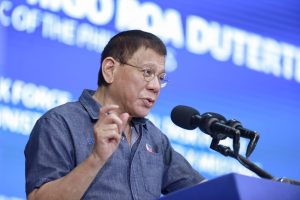Former Philippine President Rodrigo Duterte said that he would come out of retirement if his daughter, Vice President Sara Duterte, is impeached by Congress.
“You know what, if you do that, I shall be returning to politics, I will be forced, either I run for senator or vice president even if I am old already,” Duterte said on his TV show on November 20.
“I do not lose anything. I am retired. If that (impeachment) happens and I am still alive and do not have dementia yet, I will run.”
The former president is reacting to reports that some lawmakers are planning to file an impeachment complaint against the younger Duterte over the use of confidential funds.
After the end of his term as president in June 2022, Duterte announced his retirement from politics, but his three children continue to hold elected positions. Under the 1987 Constitution, he is barred from seeking another term as president but can run for other positions.
Meanwhile, Vice President Duterte is accused of improperly spending her confidential funds in just 11 days in December 2022. Confidential funds are not subject to normal auditing procedures because they are assumed to involve sensitive national security matters.
During this year’s budget debate, opposition lawmakers questioned the use of confidential funds by civilian agencies. Duterte initially rebuffed the criticisms and accused critics of being enemies of the state. After Congress realigned the confidential funds, Duterte relented and withdrew the funding request as she acknowledged that the issue had become divisive.
But her father went ballistic on live TV and accused Congress of being “the most rotten institution” as he accused the House Speaker, the first cousin of President Ferdinand Marcos Jr., of harboring an intention to run for president in 2028. The elder Duterte also threatened an opposition lawmaker who responded by filing the first criminal complaint against the former president.
The House leadership was quick to deny that an impeachment complaint was being circulated. Still, Vice President Duterte indirectly confirmed the seriousness of the issue when she told the media about her conversation with the president before the latter’s official visit to the United States.
“I believe I still have the trust of President Marcos Jr. Why? Because before he left, I asked him about the impeachment and he told me the truth that he knows about that impeachment,” Duterte said.
Asked by the media, Marcos said that Duterte does not deserve to be impeached and that his office is paying attention to the issue.
Rumors of disunity have undermined the “unity” government of Marcos over the past month. In early November, military officials confirmed that there were “chatters” of destabilization against the government. A week later, former President Gloria Arroyo, a close ally of the Dutertes, lost her position as deputy speaker of the House of Representatives after she failed to sign a resolution expressing support to the House leadership.
Duterte’s announcement to end his retirement reflects his resentment against real or imagined attempts to undercut his family’s political influence. It is difficult to ascertain if he is serious about running in the 2025 and 2028 elections since he is notorious for flip-flopping on his political decisions.
If the impeachment threat has been disowned already, the Dutertes face a more serious challenge after the House conducted a hearing about the potential entry of International Criminal Court (ICC) investigators into the country in relation to the pending probe into the former president’s role in the bloody “war on drugs.”
Even Vice President Sara Duterte issued a statement reminding lawmakers that to support the ICC investigation is an insult to the country’s independence and integrity of the local judicial process. What Duterte didn’t mention is that her statement is not just in defense of her father but also of herself since her name has been included in the documents submitted as evidence to the ICC.
That lawmakers are deliberating the possibility of cooperating with the ICC could be taken as another indicator of the growing rift between the pro-Marcos and Duterte camps. What is certain is that a Congress resolution endorsing the ICC probe would certainly provoke more hostility from the supposedly retired patriarch of the Duterte political dynasty.

































